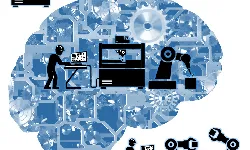
Intelligent Machining 
Manufacturers are leveraging intelligent machine tools to make decisions related to machine activity processes, allowing them to perceive their own states and the state of the surrounding environment. This technology is revolutionizing the machining industry. ▼
ADVERTISEMENT
Course Feature
![]() Cost:
Cost:
Free
![]() Provider:
Provider:
Coursera
![]() Certificate:
Certificate:
No Information
![]() Language:
Language:
English
![]() Start Date:
Start Date:
Self Paced
Course Overview
❗The content presented here is sourced directly from Coursera platform. For comprehensive course details, including enrollment information, simply click on the 'Go to class' link on our website.
Updated in [March 06th, 2023]
This course provides an introduction to intelligent machining. Students will gain an understanding of the background, tools, and terminology associated with this technology. The course will cover topics such as smart sensors and controls, various sensors and sensing techniques, process control strategies, and open architecture systems. By the end of the course, students will have a better understanding of how intelligent machining can be used to improve productivity.
[Applications]
Students who have completed this course can apply their knowledge to improve the productivity of their machining operations. They can use the sensors and sensing techniques they have learned to monitor the machining process and make adjustments as needed. They can also use the process control strategies and open architecture systems to create a more efficient and automated machining process. Finally, they can use the knowledge they have gained to develop new and innovative solutions to machining problems.
[Career Paths]
1. Automation Engineer: Automation engineers are responsible for designing, developing, and maintaining automated systems and processes. They use a variety of technologies, such as robotics, artificial intelligence, and machine learning, to create efficient and cost-effective solutions. The demand for automation engineers is increasing as businesses look to reduce costs and increase efficiency.
2. Robotics Technician: Robotics technicians are responsible for the maintenance and repair of robotic systems. They must be knowledgeable in the operation of robotic systems, as well as the programming and troubleshooting of robotic systems. Robotics technicians are in high demand as the use of robotics in manufacturing and other industries continues to grow.
3. Machine Learning Engineer: Machine learning engineers are responsible for developing and deploying machine learning algorithms and models. They must be knowledgeable in the use of various machine learning techniques, such as supervised and unsupervised learning, and be able to develop and optimize machine learning models. The demand for machine learning engineers is increasing as businesses look to leverage the power of machine learning to improve their operations.
4. Industrial Automation Engineer: Industrial automation engineers are responsible for designing, developing, and maintaining automated systems and processes in industrial settings. They must be knowledgeable in the use of various automation technologies, such as robotics, artificial intelligence, and machine learning, to create efficient and cost-effective solutions. The demand for industrial automation engineers is increasing as businesses look to reduce costs and increase efficiency.
[Education Paths]
1. Bachelor of Science in Mechanical Engineering: This degree program provides students with a comprehensive understanding of the principles of mechanical engineering, including the design, analysis, and manufacture of mechanical systems. Students will learn about the latest technologies and trends in intelligent machining, such as the integration of smart sensors and controls, process control strategies, and open architecture systems.
2. Master of Science in Robotics and Automation: This degree program focuses on the development of robotic systems and automation technologies. Students will learn about the fundamentals of robotics, including the design, programming, and control of robotic systems. They will also gain an understanding of the principles of intelligent machining, such as the integration of sensors and controls, process control strategies, and open architecture systems.
3. Master of Science in Computer Science: This degree program provides students with a comprehensive understanding of the principles of computer science, including the design, analysis, and implementation of computer systems. Students will learn about the latest technologies and trends in intelligent machining, such as the integration of smart sensors and controls, process control strategies, and open architecture systems.
4. Doctor of Philosophy in Intelligent Machining: This degree program focuses on the development of intelligent machining technologies. Students will learn about the fundamentals of intelligent machining, including the design, programming, and control of intelligent machining systems. They will also gain an understanding of the principles of intelligent machining, such as the integration of sensors and controls, process control strategies, and open architecture systems.
Pros & Cons

Excellent information on digital manufacturing

Gives perspective of automation and digital manufacturing

Good for beginner awareness

Erudite professors

Very useful to understand basics

Gives information about intelligent machines

Stay updated to current technology

Audio quality needs improvement

Need to master machine learning and big data
Course Provider

Provider Coursera's Stats at AZClass
Intelligent Machining gives you a better understanding of the background of intelligent machining, including its history, tools, and related terminology. This knowledge can help learners better understand the current status of the industry and the potential for future development. In addition, learners can learn about various components of intelligent machining, such as sensors, sensing technologies, process control strategies, and open architecture systems. Learners can learn how to use the integration of smart sensors and controls to increase productivity. This knowledge can help learners better understand the potential of intelligent processing and how it can be harnessed to increase efficiency and reduce costs.
Discussion and Reviews
0.0 (Based on 0 reviews)
Explore Similar Online Courses

Sharing Cities: Governance and Urban Sustainability

Build a day trading journal with Google sheets for beginners

Python for Informatics: Exploring Information

Social Network Analysis

Introduction to Systematic Review and Meta-Analysis

The Analytics Edge

DCO042 - Python For Informatics

Causal Diagrams: Draw Your Assumptions Before Your Conclusions

Whole genome sequencing of bacterial genomes - tools and applications

Cyber Security in Manufacturing

Creating Toolpaths for a CNC Lathe

Introduction to Solid Edge
 Related Categories
Related Categories
 Popular Providers
Popular Providers
Quiz
 Submitted Sucessfully
Submitted Sucessfully
1. What is the main purpose of this course?
2. What is the main benefit of intelligent machining?
3. What type of systems are leveraged to enable intelligent machining?
4. What is the main purpose of intelligent machining?
5. What is the purpose of intelligent machining?
Correct Answer: To improve productivity.


Start your review of Intelligent Machining